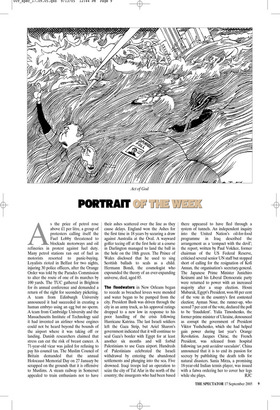PORTRAIT OF THE WEEK A s the price of petrol rose
above £1 per litre, a group of protesters calling itself the Fuel Lobby threatened to blockade motorways and oil refineries in protest against fuel duty. Many petrol stations ran out of fuel as motorists resorted to panic-buying. Loyalists rioted in Belfast for two nights, injuring 30 police officers, after the Orange Order was told by the Parades Commission to alter the route of one of its marches by 100 yards. The TUC gathered in Brighton for its annual conference and demanded a return of the right for secondary picketing. A team from Edinburgh University announced it had succeeded in creating a human embryo using an egg but no sperm. A team from Cambridge University and the Massachusetts Institute of Technology said it had invented an airliner whose engines could not be heard beyond the bounds of the airport where it was taking off or landing. Danish researchers claimed that stress can cut the risk of breast cancer. A 71-year-old vicar was jailed for refusing to pay his council tax. The Muslim Council of Britain demanded that the annual Holocaust Memorial Day on 27 January be scrapped on the grounds that it is offensive to Muslims. A steam railway in Somerset appealed to train enthusiasts not to have their ashes scattered over the line as they cause delays. England won the Ashes for the first time in 18 years by securing a draw against Australia at the Oval. A wayward golfer teeing off at the first hole at a course in Darlington managed to land the ball in the hole on the 18th green. The Prince of Wales disclosed that he used to sing Scottish ballads to seals as a child. Hermann Bondi, the cosmologist who expounded the theory of an ever-expanding universe, died, aged 85.
The floodwaters in New Orleans began to recede as breached levees were mended and water began to be pumped from the city. President Bush was driven through the city in an army truck, as his approval ratings dropped to a new low in response to his poor handling of the crisis following Hurricane Katrina. The last Israeli soldiers left the Gaza Strip, but Ariel Sharon’s government indicated that it will continue to seal Gaza’s border with Egypt for at least another six months and will forbid Palestinians to use Gaza airport. Hundreds of Palestinians celebrated the Israeli withdrawal by entering the abandoned settlements and plunging into the sea. Five drowned. Iraqi troops led an operation to seize the city of Tal Afar in the north of the country; the insurgents who had been based there appeared to have fled through a system of tunnels. An independent inquiry into the United Nation’s oil-for-food programme in Iraq described the arrangement as a ‘compact with the devil’; the report, written by Paul Volcker, former chairman of the US Federal Reserve, criticised several senior UN staff but stopped short of calling for the resignation of Kofi Annan, the organisation’s secretary-general. The Japanese Prime Minister Junichiro Koizumi and his Liberal Democratic party were returned to power with an increased majority after a snap election. Hosni Mubarak, Egypt’s President, won 88 per cent of the vote in the country’s first contested election; Ayman Nour, the runner-up, who scored 7 per cent of the vote, declared the poll to be ‘fraudulent’. Yulia Timoshenko, the former prime minister of Ukraine, denounced as corrupt the government of President Viktor Yushchenko, which she had helped gain power during last year’s Orange Revolution. Jacques Chirac, the French President, was released from hospital following ‘un petit accident vasculaire’. China announced that it is to end its passion for secrecy by publishing the death tolls for natural disasters. Sania Mirza, a promising 18-year-old Indian tennis player, was issued with a fatwa ordering her to cover her legs while she plays. RJC



















































 Previous page
Previous page